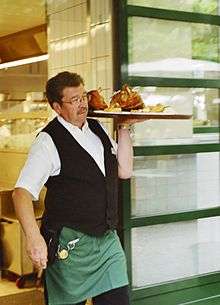waiter
English
Etymology
Late 14th century, "attendant, watchman," agent noun from the verb wait + -er. Sense of "servant who waits at tables" is from late 15th century, originally in reference to household servants; in reference to inns, eating houses, etc., it is attested from 1660s. Feminine form waitress first recorded 1834. [1]
The London Stock Exchange sense harks back to the early days of trading in coffee-shops.
Pronunciation
- (Received Pronunciation) IPA(key): /ˈweɪtə/
- (US) IPA(key): /ˈweɪt̬ɚ/
Audio (US) (file) - Rhymes: -eɪtə(ɹ)
Noun

a waiter.
waiter (plural waiters, feminine waitress)
- A male or sometimes female attendant who serves customers at their tables in a restaurant, café or similar.
- 1918, W. B. Maxwell, chapter 2, in The Mirror and the Lamp:
- She was a fat, round little woman, richly apparelled in velvet and lace, […]; and the way she laughed, cackling like a hen, the way she talked to the waiters and the maid, […]—all these unexpected phenomena impelled one to hysterical mirth, and made one class her with such immortally ludicrous types as Ally Sloper, the Widow Twankey, or Miss Moucher.
- 1963, Margery Allingham, chapter 5, in The China Governess:
- A waiter brought his aperitif, which was a small scotch and soda, and as he sipped it gratefully he sighed.
‘Civilized,’ he said to Mr. Campion. ‘Humanizing.’ […] ‘Cigars and summer days and women in big hats with swansdown face-powder, that's what it reminds me of.’
- Waiter! There's a fly in my soup.
-
- (literally) Someone who waits for somebody or something; a person who is waiting.
- 2013, Siciliani Luigi, Borowitz Michael, Moran Valerie, OECD Health Policy Studies: Waiting Time Policies in the Health Sector
- However, the NTPF also contained implicit negative incentives for the public sector by offering alternative private sector treatment for the longest waiters at no extra cost to patients or no penalty to public providers.
- 2013, Siciliani Luigi, Borowitz Michael, Moran Valerie, OECD Health Policy Studies: Waiting Time Policies in the Health Sector
- A person working as an attendant at the London Stock Exchange.
- (obsolete) A vessel or tray on which something is carried, as dishes, etc.; a salver.
Derived terms
Translations
a server in a restaurant or similar
|
|
someone who waits
Old French
Conjugation
This verb conjugates as a first-group verb ending in -er. The forms that would normally end in *-ts, *-tt are modified to z, t. Old French conjugation varies significantly by date and by region. The following conjugation should be treated as a guide.
Conjugation of waiter (see also Appendix:Old French verbs)
| simple | compound | ||||||
|---|---|---|---|---|---|---|---|
| infinitive | waiter | avoir waité | |||||
| gerund | en waitant | Use the gerund of avoir followed by the past participle | |||||
| present participle | waitant | ||||||
| past participle | waité | ||||||
| person | singular | plural | |||||
| first | second | third | first | second | third | ||
| indicative | jo | tu | il | nos | vos | il | |
| simple tenses |
present | wait | waites | waite | waitons | waitez | waitent |
| imperfect | waitoie, waiteie, waitoe, waiteve | waitoies, waiteies, waitoes, waiteves | waitoit, waiteit, waitot, waiteve | waitiiens, waitiens | waitiiez, waitiez | waitoient, waiteient, waitoent, waitevent | |
| preterite | waitai | waitas | waita | waitames | waitastes | waiterent | |
| future | waiterai | waiteras | waitera | waiterons | waiteroiz, waitereiz, waiterez | waiteront | |
| conditional | waiteroie, waitereie | waiteroies, waitereies | waiteroit, waitereit | waiteriiens, waiteriens | waiteriiez, waiteriez | waiteroient, waitereient | |
| compound tenses |
present perfect | Use the present tense of avoir followed by the past participle | |||||
| pluperfect | Use the imperfect tense of avoir followed by the past participle | ||||||
| past anterior | Use the preterite tense of avoir followed by the past participle | ||||||
| future perfect | Use the future tense of avoir followed by the past participle | ||||||
| conditional perfect | Use the conditional tense of avoir followed by the past participle | ||||||
| subjunctive | que jo | que tu | qu’il | que nos | que vos | qu’il | |
| simple tenses |
present | wait | waiz | wait | waitons | waitez | waitent |
| imperfect | waitasse | waitasses | waitast | waitissons, waitissiens | waitissoiz, waitissez, waitissiez | waitassent | |
| compound tenses |
past | Use the present subjunctive of avoir followed by the past participle | |||||
| pluperfect | Use the imperfect subjunctive of avoir followed by the past participle | ||||||
| imperative | – | tu | – | nos | vos | – | |
| — | waite | — | waitons | waitez | — | ||
References
- Godefroy, Frédéric, Dictionnaire de l'ancienne langue française et de tous ses dialectes du IXe au XVe siècle (1881) (waiter)
This article is issued from
Wiktionary.
The text is licensed under Creative
Commons - Attribution - Sharealike.
Additional terms may apply for the media files.